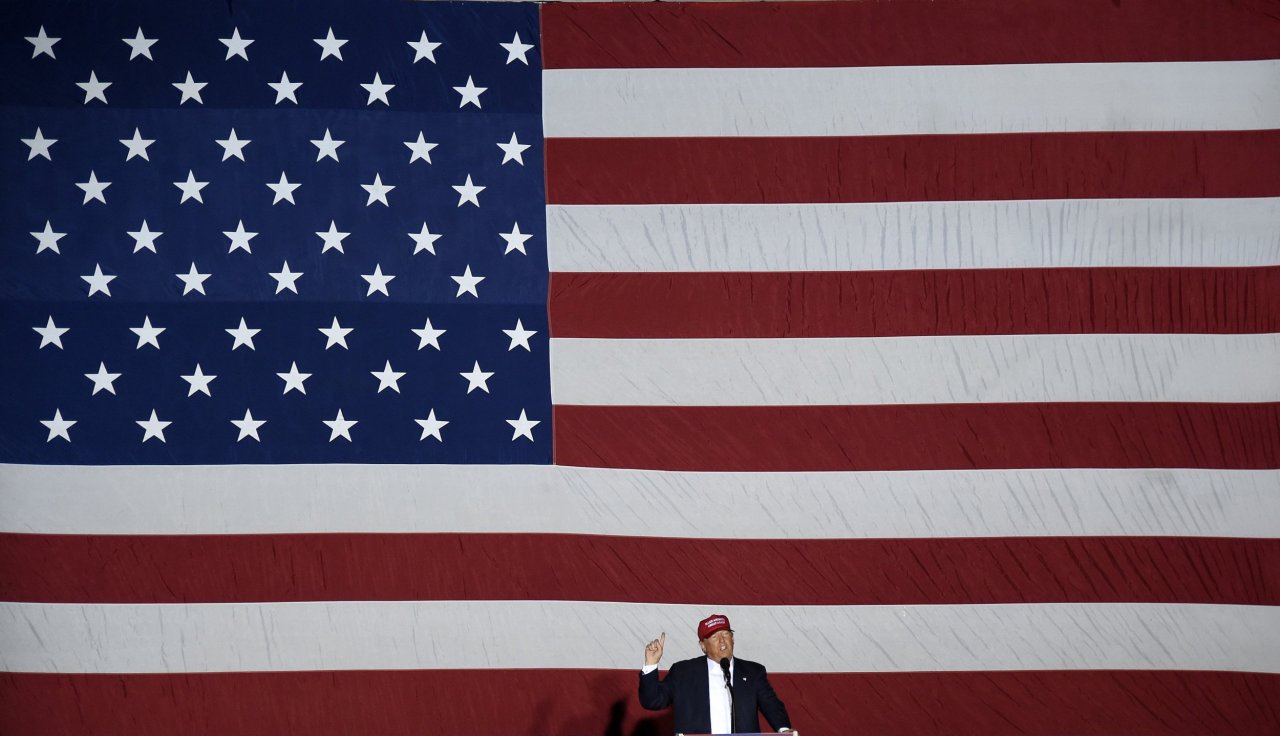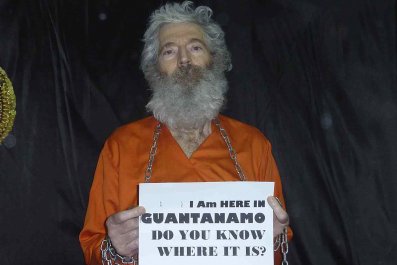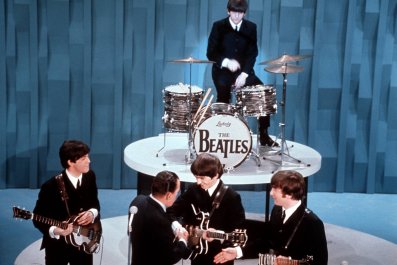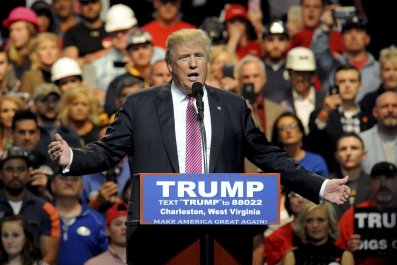Almost a year into his surreal campaign for president, the American political class still doesn't know what to make of Donald Trump. The billionaire mogul's defiance of all the standard rules of American politics, not to mention the orthodoxy of his own party, has left pundits scrambling to explain his takeover of the Republican Party. They should look abroad. Ironically, a campaign built on "making America great again" bears a strong resemblance to right-wing movements overseas, past and present. Maybe the question, then, is not how Trump did it but why the United States hasn't seen this kind of movement take off until now. Instead of underlining American exceptionalism, Trump is unleashing a political force that's already prominent in other parts of the world.
Even a Trump rally feels different from a normal campaign event, something more akin to a rock concert or a megachurch prayer session. Trump took questions at a rally outside Cincinnati in mid-March, for example, but the audience was more interested in fawning over than grilling him. "I love you, Donald Trump. Man, you're the future of America," a middle-aged man, decked out in an American flag and a Cincinnati Reds baseball cap, told the mogul. "I've been waiting 17 hours to see you today...and I would love to get a picture with you before I leave." A white, middle-aged woman requested a hug from the candidate, and another woman told him, "It is so refreshing to have a presidential candidate that is not bought and paid for. I believe in you, that you will make America great again."
"That's better than a question," said a beaming Trump. "I love it."
Sure, Bernie Sanders has his groupies, as did Barack Obama before him—voters swooning for the symbolism of a candidate, more interested in image than issues. With Trump, however, it's always been centered on the big man himself—the guy with the personal helicopter, reality show one-liners, "best ever" deal-making abilities and eponymous steaks. It's a brand of politics very familiar to those who study leaders in other parts of the world. Critics and comedians have compared Trump to Adolf Hitler, Idi Amin of Uganda and other notorious demagogues, suggesting the mogul would govern like a murderous autocrat. That's a stretch. What is abundantly clear, however, is that the Trump campaign is employing many of the political tactics those men used so effectively. And he joins a crop of politicians currently using a similar strain of politics to amass power in Europe and elsewhere.
The Policy-Free Campaign
For months, pundits dismissed Trump's candidacy, arguing that once voters started paying attention, his lack of substance would crater his support. Now that he's the Republicans' presumptive nominee, it's clear the early naysayers sorely miscalculated. The lesson from this race: A strong cult of personality can trump ideology. And that's been proved by generations of demagogues. The support behind Italy's Benito Mussolini was "more about the leader than...about the party or the ideology," bypassing or even upending the traditional party structures, says Arfon Rees, a specialist in Soviet and Russian history at the U.K.'s University of Birmingham.
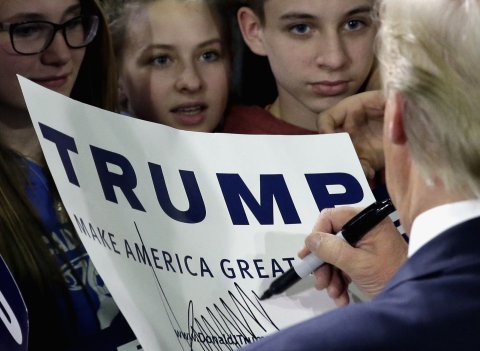
There are other parallels, says Joseph Sassoon, an associate professor at Georgetown University's School of Foreign Service. When Trump says he's his own best adviser and has no speechwriters, "this is really a prototype of Saddam or Qaddafi or Nasser...the wanting to control the language of their speeches," says Sassoon, referencing former leaders of Iraq, Libya and Egypt. " An essential component of the cult of personality is it cannot be shared with anyone."
German philosopher Max Weber coined the term charismatic authority to describe leaders whose power is built on their "exceptional sanctity, heroism or exemplary character," as opposed to the rule of law or simply brute force. Many may not regard Trump the candidate in an admirable light, but to his followers, his business success and his personal wealth — which freed him from the unseemly campaign fundraising dance of his primary rivals — make him inviolable. American politicians are "all bought and paid for by somebody," 62-year-old Trump supporter Nick Glaub said outside the suburban Cincinnati Trump rally. "The only person that isn't is that man right there," said Glaub, gesturing to the community center where the real estate mogul had just spoken.
Trump's charismatic authority stems from this belief that he is above politics-as-usual, says Roger Eatwell, a politics professor at Britain's University of Bath. And it goes beyond his reality-TV fame. "Celebrity...tends to be a fairly passing phenomenon, and it doesn't tend to be a very emotional phenomenon," Eatwell explains. But Trump's campaign offers something deeper: "a sense of identification."
The feeling of solidarity Trump offers his adherents—specifically those who have been alienated from mainstream politics—is as central to the mogul's appeal as his blustery persona. It's true that he is shockingly shallow on policy, but his populist and nationalistic appeals hit people at a deeper level than his position on tax rates or spending proposals. Or at least they are more visceral. They are also central to the pitches right-wing movements in Europe have been making for more than a century.
Revenge of the Marginalized
Trump's ability to connect with angry American voters also parallels that of European leaders in today's crop of ascendant right-wing parties. The continent's right-leaning populists of the early 20th century galvanized "people who were previously disenfranchised or had very little role in terms of conventional politics," says Rees. Fast-forward to the 21st century, and parties such as France's National Front, led by Marine Le Pen, and the Austrian Freedom Party are targeting a similar demographic. And like the Donald, Europe's modern right-wing leaders "have quite strong male support—they're often 60-plus percent male voting support," notes Eatwell, who specializes in right-wing European politics. Many of those men are "blue-collar workers who fear losing their jobs, or they've been de-skilled [and] feel threatened by the change, as a man."
Trump frequently points out that he is bringing into the political process people who rarely vote—those who have been, in one way or another, marginalized. A Quinnipiac University poll released April 5 shows the depths of alienation of Trump supporters: While 62 percent of all U.S. voters agree that their "beliefs and values are under attack," that number soars to 91 percent among Trump backers. And 90 percent of Trump supporters agreed that "public officials don't care much what people like me think." Leaders like Mussolini and Hitler played to similar audiences, those who resented the "dominance of a kind of intellectual elite that tends to hold the masses in a certain kind of contempt," Rees says.
The Power of Baby Talk
A common way populist leaders burnish their anti-elite bona fides is through a lowbrow speaking style. Trump's third- or fourth-grade language level has made him a media punch line, but he's hardly the first politician to use little words to gain mass appeal. Many of the most successful populists "talk in everyday speech to their target audience," says Eatwell. Eschewing upper-middle-class academic sentence construction for short, declarative "common" phrasing "helps say they're not part of the system," he explains. This is a fundamental element of Trump's appeal.
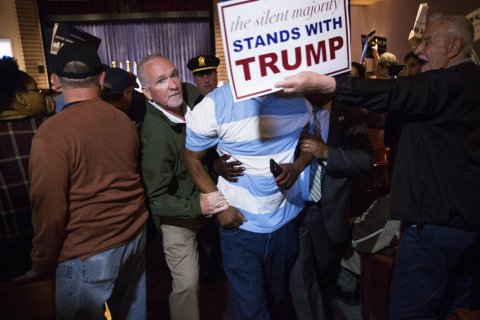
And it's not just the speaking style that is simplified. Rees says a common theme of the right-wing regimes he studies is their simplification of the entire political discourse, "reducing it to basic binary opposites, of black and white," and, of course, of us vs. them. Psychological theory holds that targeting the "other" helps a group construct its own identity: "You say...what you are not," as Eatwell puts it. For Trump, the "other" is immigrants—Mexican and Muslim, in particular. In Nazi Germany, it was the Jews.
Rees sums up the mindset as: "We don't really need complexity. We know what the problem is. We know what the solution is. All we need is the will to do it."
Big-Man Politics
There is, however, one glaring difference between the Republican front-runner and Europe's right-wing leaders in 2016: Trump's conspicuous wealth. While he flaunts his billionaire lifestyle, Europe's populists play up their everyman credentials. Nigel Farage, head of the right-wing U.K. Independence Party, "loves to be photographed in an English pub" having a beer, says Eatwell. It's a show of solidarity that's important on a continent where class remains a salient divide and austerity's bite is deep. Americans, in contrast, embrace capitalism far more openly and aren't necessarily turned off by Trump's gilded excess.
On that front, Trump's behavior resembles that of politicians on yet another continent: Africa. The Daily Show host Trevor Noah alluded to that back in October, in a bit highlighting how much some of Trump's proclamations echo those of African strongmen like Muammar el-Qaddafi and Zimbabwe's Robert Mugabe. "Trump is basically the perfect African president," joked Noah, a South African.
"The branding of Trump, the opulence, is something people running for president and parliament in Africa bank on," says Georgetown professor Yonatan Morse, who specializes in African politics. "It's rooted in…the idea of being a successful person who can take care of other people," particularly "groups that have not received as much until now."
Of course, none of these messages spur a movement unless there is broad disenchantment with the political system. It's not fair to compare American political gridlock today to the economic collapse Germany suffered after World War I, but it's hard not to hear Trump supporters' complaints in Rees's description of the widespread feeling in the Weimar Republic that the country was failing "because of the corruption of the existing order and the kind of horse trading and shabby compromise that politicians engage in."
Which is not to say Trump is the next Hitler or Mussolini. Using a similar playbook doesn't always result in the same outcomes. Still, there's some irony in the fact that a man whose pitch to voters is "America first" is selling a message manufactured overseas—just like those Trump suits and ties.



